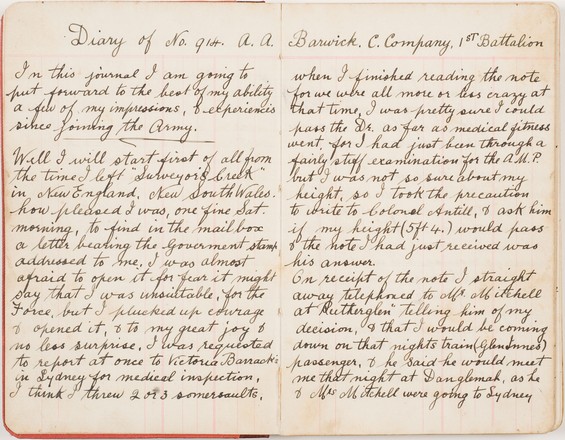
Archie Barwick diaries
1: Archibald (Archie) Albert Barwick diary
22 August 1914-September 1915
MLMSS 1493/Box 1 /Item 1, pp. 3-4
2: Archibald (Archie) Albert Barwick diary
4 October 1916-7 November 1916
MLMSS 1493/Box 1 /Item 6, pp. 110-111
3: WW1 medals conferred on Sgt. Archibald Albert Barwick
On loan from the Barwick family
4: Archibald (Archie) Albert Barwick
ca. 1914
Unknown photographer
Kindly provided by the Barwick family
22 August 1914-September 1915
MLMSS 1493/Box 1 /Item 1, pp. 3-4
2: Archibald (Archie) Albert Barwick diary
4 October 1916-7 November 1916
MLMSS 1493/Box 1 /Item 6, pp. 110-111
3: WW1 medals conferred on Sgt. Archibald Albert Barwick
On loan from the Barwick family
4: Archibald (Archie) Albert Barwick
ca. 1914
Unknown photographer
Kindly provided by the Barwick family
Tasmanian Archie Barwick was working on a farm at Surveyors Creek in the New England area of New South Wales when he signed-up to the Australian Imperial Force (AIF) to serve in World War I. At the age of 24 on 24 August, 1914, Archie enlisted as a corporal, and was later promoted to sergeant, in C Company, 1st Battalion, A.I.F.
Archie served in the Gallipoli campaign as well as in France and Belgium. He was wounded on three separate occasions, the third of which was the most serious. In April 1918 he received a severe chest wound from a shell that exploded near him in Belgium. As a result, Archie was evacuated to England and was hospitalised in Birmingham. In early 1919 at the end of the War, Archie returned to Australia on board the Port Hacking.
Throughout the duration of the War, Archie produced 16 individual diary volumes- both his first and sixth diary volumes are on display here. He provides a matter of fact account of the battles, and writes regularly of his many friends and his brother Len, who served alongside him. In many instances his sense of humour shines through, even in the worst days of trench warfare on the Western Front.


 Back to list
Back to list